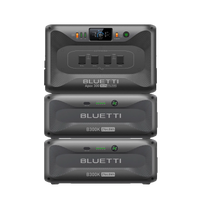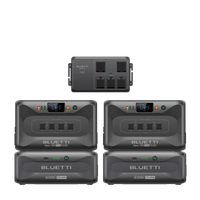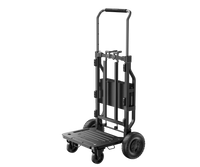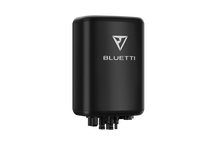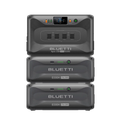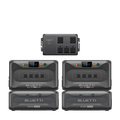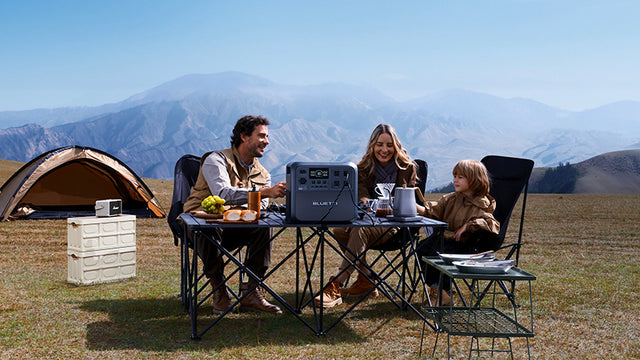Your cart is empty
Shop our productsWe are certain that most of you reading this article have heard about exploding mobile phones before. For example, a student's phone exploded during repair at a shop.
While not common, these unfortunate events do, in fact, occur. However, we feel it is important to keep things in perspective when it comes to the accident vs. safe ratio.
According to GSMA real-time intelligence data, there are more than 12.17 billion mobile connections globally. That surpasses the worldwide population by 4.08 billion.
So yes, accidents do happen, but when putting things in perspective, how frequently do they happen in comparison to the sheer volume of safe phones on planet earth (just some food for thought here)?
Why Are We Even Talking About Mobile Phones?
You want to know about solar generators and whether they can catch fire.
The answer lies in a shared component: the battery.
Can Solar Generators Catch Fire?
This is one of the most common concerns for first-time solar generator buyers. Before we answer this question, it is important that you know what makes up a solar generator.
Understanding its components will allow you to better understand any potential fire (among other hazards).
A solar generator is made from the following components:
-
Solar panels (attachable)
-
Inverter
-
Charge controller
-
Battery
-
Wiring
-
Circuit boards
Now that you have a better idea of what makes up a solar generator, it'll be easier to understand what could be potentially hazardous.

Component Safety
|
Component |
Safety |
|
Solar Panels |
Safe |
|
Inverter |
Safe |
|
Charge Controller |
Safe |
|
Battery |
Potentially Hazardous |
Out of all the components that make up a solar generator, there is only one piece of that technology that has the ability to explode or catch fire (under unfavorable circumstances): the battery.
However, it must be mentioned that the overall probability of something going wrong really all comes down to the battery chemistry used in your solar generator.
Some battery chemistries are less stable than others, such as:
-
Lithium-Ion
-
Lead-Acid
-
Nickel-Cadmium
With the above in mind, it is important to note that commercial solar generators typically use LFP for safety, while DIYers may opt for cheaper lead-acid batteries, which are heavier and less safe.
Why Lithium-Ion Batteries May Explode

Lithium-ion is the same battery chemistry used in mobile phones today.
Whenever a lithium-ion type battery is charged, ions move from the positive to the negative electrode (generally at quite a high voltage).
These moving ions are actually moving through a liquid electrolyte, which is an extremely flammable substance.
This is why a battery has the potential to explode (in flames) if it overheats. Now remember, most modern batteries have a built-in battery management system (BMS), which prevents this from happening.
What Is The Safest Battery Technology?
One of the safest battery technologies on the market is lithium iron phosphate batteries (LiFePO₄ or LFP).
This is the battery technology used in BLUETTI's solar generators.
-
LFP batteries are the safest lithium technology on the market today.
-
They are unlikely to overheat.
-
LFP batteries are highly resistant to fire, even if punctured, due to their stable chemistry, but extreme abuse can still pose risks.
-
The cathode material is non-hazardous and poses no immediate environmental risk.
Why are BLUETTI solar generators safe?

As mentioned, BLUETTI only uses LiFePO4 batteries in products.
-
Most BLUETTI solar generators are equipped with the latest MPPT charge controllers, ensuring the batteries do not overcharge.
-
The batteries are equipped with power BMSs, which ensure protection against short circuits, overcurrent, overvoltage, overload, or overheating.
⚠️ Do not open or modify these products yourself, as it could compromise safety features.
How Long Do Bluetti Solar Generators Last?
Here is an easy-to-understand table indicating lifespans:
|
Model |
Chemistry |
Life cycles |
|
EB3A |
LFP |
2,500 + |
|
EB70S |
LFP |
2,500 + |
|
AC200P |
LFP |
3,500 + |
|
AC200 MAX |
LFP |
3,500 + |
|
AC300 + B300K |
LFP |
3,500 + |
|
Elite 200 V2 |
LFP |
6,000+ |
|
Elite 100 V2 |
LFP |
4,000+ |
|
Apex 300 |
LFP |
6000+ |
To put this in perspective, you can expect your solar generator to last 7-15 years, depending on usage.
Featured BLUETTI Solar Generators
Here are two standout models built to meet different needs:
BLUETTI Elite 100 V2 – The Portable Camping Powerhouse

The specs of BLUETTI Elite 100 V2 are:
-
Portability Redefined: Lightweight yet rugged, making it easy to carry for road trips or remote camping
-
Full Solar Charging: Reach a 100% charge in just 70 minutes with 1,000W MPPT solar input.
-
Versatile Power On-the-Go: Keep essentials running, lights (10W for 51.8 hrs), fans, grills, or even a fridge (14.3 hrs at 50W).
-
HyperVolt™ Surge Power: Delivers up to 3,600W surge for high-demand gadgets like kettles.
-
Silent Operation: Operates at just 30 dB, ensuring peaceful nights under the stars.
-
Best For: Adventurers, campers, and off-grid explorers who need lightweight portability without sacrificing power.
BLUETTI Elite 200 V2 – The Home Emergency Guardian

The specs of BLUETTI Elite 200 V2 are:
-
Zero Disruptions with UPS: 15 ms automatic switch for uninterrupted power to medical devices, servers, or routers.
-
Massive Energy Storage: 2,073.6Wh capacity, 2,600W output, 3,900W Power Lifting Mode..
-
10-Year Battery Life: Powered by LiFePO₄ cells rated for 6,000+ cycles, guaranteeing long-term reliability.
-
Blazing-Fast AC Charging: TurboBoost™ gets you to 80% in just 1 hour.
-
Quiet Confidence: Runs at 16 dB, so you can power critical devices through the night undisturbed.
-
Best For: Households needing reliable backup during blackouts or emergencies.
Both models come with cutting-edge safety features (BMS + MPPT + LiFePO₄ cells), offering 6.8–9.5 years of expected life depending on usage.
Final thoughts
We hope this article sheds some more light on how batteries explode and which technologies are the safest out there. Solar generators, like the BLUETTI Elite 100 V2 and Elite 200 V2, offer reliable, eco-friendly power for camping, emergencies, or off-grid living, with LiFePO4 (LFP) batteries providing superior safety compared to traditional lithium-ion chemistries. Expect 7–15 years of lifespan with 3,000–6,000+ cycles, depending on usage. To stay safe, choose UL-certified units, monitor for overheating via apps, and follow manufacturer guidelines. With responsible handling, solar generators empower sustainable energy without compromising safety. Ready to power up securely?
Shop products from this article
Be the First to Know
You May Also Like

What Does a 30% Federal Solar Tax Credit Mean and How to Apply?
Governments around the world are offering programs that encourage homeowners to switch to solar energy. Among the most notable programs is the 30% Federal Solar Tax Credit. It reduces your...

Deadly Flooding Devastates U.S. South and Midwest — What You Need to Know















